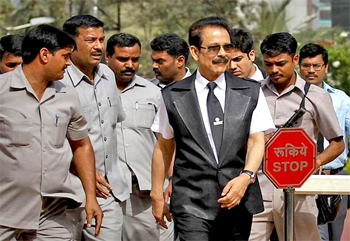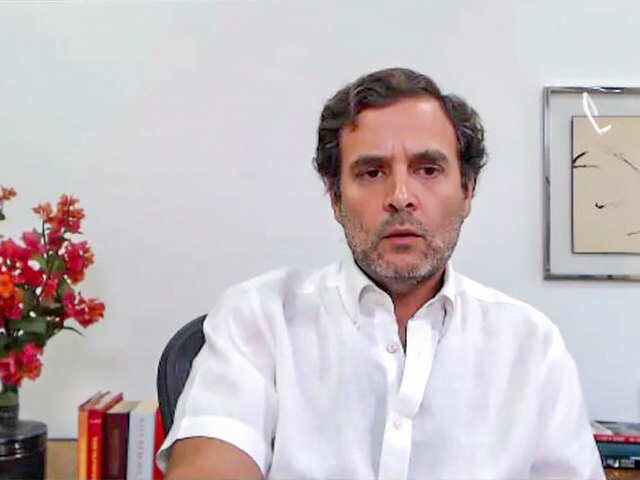Mumbai, Feb 5: Subrata Roy, the boss of the Sahara conglomerate, is in a New Delhi prison on contempt-of-court charges and needs to post $1.6 billion in bail to get out. To help raise the money, Sahara is in talks to refinance its overseas hotels, including New York's Plaza.

The only problem: It's unclear if the man who's orchestrating the deal, a 34-year-old former broker named Saransh Sharma, has the money to pull it off.
Sahara's head of corporate finance, Sandeep Wadhwa, said Sahara's lawyers had verified with Bank of America that Sharma has deposited just over $1 billion in an account at the bank that is "earmarked for the said transaction."
That account, however, doesn't appear to exist. A manager at the bank told Reuters that he didn't write a crucial document attributed to him: an email, sent in his name to Sahara, which purported to verify the account's existence.
After Reuters asked the bank to look into the account, spokeswoman Jumana Bauwens issued a statement saying: "Bank of America isn't involved in the transaction."
What's more, Sharma, who lives in San Jose, California, has admitted to stealing a database from a former employer. There are also two pending lawsuits against him alleging he forged a letter and produced fake documents to obtain a loan.
Bank of America's assertion that it has nothing to do with the deal, as well as details about Sharma's past, could throw a wrench into Sahara's efforts to free Roy in a case that has made headlines in India for almost a year.
Roy is being held at Tihar jail, the largest in India, on contempt charges for failing to comply with a court order to repay investors in a bond scheme later ruled to be illegal. The bail amount, the largest ever in India, reflects the cost of the illegal scheme, estimated by Indian regulators to be as much as $7 billion.
A lawyer working for Sahara, speaking on the condition of anonymity, said the company's lawyers had not separately checked with Bank of America to see whether Sharma had a billion-dollar account with the bank. Instead, the lawyer said, Sahara relied on a letter from the bank saying the funds were there. Sahara declined to comment on the lawyer's assertion.
Sharma told Reuters he is backed by a group of U.S. and U.K. investors for the refinancing and that the funds in the account have come from them. Both he and Sahara declined to identify the investors.
Sharma, who spoke with Reuters on Jan. 23 and sent a subsequent email on Jan. 28, said in an emailed statement on Wednesday that Mirach had faced "a number of challenges in closing this transaction" and that he wouldn't disclose "sensitive details" about the deal until it closes.
Under the proposed deal, which Sharma said he reached with Sahara in December, Sharma's investor group would help pay off about $880 million of a Bank of China loan for the hotels. Besides the Plaza, which Sahara bought for about $570 million in 2012, the properties also include the Dream Hotel in downtown New York and the Grosvenor House in London.
Sharma and the investor group also agreed to lend $650 million to Sahara and make a $450 million investment in the conglomerate's properties in India. Sahara and Sharma have said they expect to finalize the deal by Feb. 20.
It is unclear how paying off the Bank of China loan, or obtaining the loan and investment, would help Sahara pay Roy's bail and refund money to the bond investors.
Sahara's businesses range from financial services to media, retail and real estate. The company used to sponsor the Indian cricket team, which helped to make it a household name in the country. During his heyday, Roy, 66, socialized with presidents and film stars. Seen as a maverick among India's conservative business elite, his self-appointed title is "Managing Worker," and he's known in the company as "Saharasri," or "Mr. Sahara."
Sahara's troubles started in 2011 when it was found by the Securities and Exchange Board of India (SEBI), the market regulator, to have illegally sold billions of dollars of bonds to investors. After a legal battle that reached the Indian Supreme Court, Sahara was ordered to refund investors the money.
The Supreme Court threw Roy in jail last March after he failed to appear at a contempt hearing related to the dispute with the regulator and set his $1.6 billion bail. Sahara has said that it has repaid most investors, a claim SEBI has disputed.
Since Roy's imprisonment, Sahara has been trying to raise cash. It has been reporting its progress to the court and regulators, and needs approvals from them to do these transactions.
Sahara told the Supreme Court last month that it is in talks with Mirach Capital, the company Sharma set up to do the deal with Sahara. Sahara has shown the court a Jan. 5 letter from Bank of America, saying it is holding $1.05 billion in funds in an account on behalf of Mirach Capital for Sahara, according to a court filing. Sahara and Sharma declined to show Reuters a copy of the letter.
BANK MANAGER
Reuters has seen an email, dated Dec. 17, sent in the name of Nuno Marques, a Bank of America banking center manager in Wellington, Florida, to Sahara finance executive Wadhwa. In the email, the writer attests that Mirach "has sufficient liquidity with Bank of America to undertake the said transactions" with Sahara. The email does not specify the amount of funds Mirach has, but says the money would be put into escrow after anti-money laundering-related checks.
Marques, contacted by Reuters for comment on Feb. 3 at his office in Florida, denied having written the Dec. 17 e-mail. He said he had been called by another Bank of America employee to verify whether there were Mirach Capital funds on deposit and that he told her he couldn't do so.
Sahara declined to comment further, saying it was bound by "strict confidentiality provisions" as part of the talks with Mirach.
Shekhar Naphade, an independent lawyer advising the Indian Supreme Court on the case against Roy, said he had "no concrete details about the Bank of America escrow account" beyond the letter submitted by Sahara. Naphade said he didn't have the means to independently verify the claim made by Sharma about the bank account.
Sources familiar with the Reserve Bank of India's investigations into Sahara said the regulator had not received a request from the Supreme Court to probe whether the money is in the Bank of America account, but was making some initial checks of its own.
Sources familiar with SEBI said if the hotel deal does not go through, Indian government officials would seize and sell Sahara assets, including its hotels and properties, to raise cash.
FORMER BROKER
Sharma has spent the past decade working on and off for small independent brokerages in the United States, a Reuters review of U.S. regulatory filings shows.
He said in an interview that he had experience "transacting several multibillion dollar deals." He declined to give details, however, and said he had not successfully completed such deals before.
In 2013, Sharma sued a U.S. hedge fund for alleged breach of contract. In a Dec. 15, 2013, deposition in a New York federal civil court case, Sharma admitted to fabricating an email; to selling for $10,000 a database of contacts he stole from a previous employer, the investment bank AllianceBernstein; and to lying about the sources of funds he had obtained. A spokesman for AllianceBernstein declined to comment.
Sharma's case was dismissed. Sharma confirmed his statements made in the deposition, but said he had learned from his past mistakes.
He also has two other civil lawsuits pending against him in California courts.
A lawsuit filed by private equity firm Disruptive Technology Associates in August 2013 alleges Sharma forged a letter from the Bank of the West, saying that he had $400,000 in an account with the San Francisco based lender. A spokeswoman for Bank of the West declined to comment.
Another lawsuit filed by hedge fund Midwest Energy Resources in November 2013 alleges that he produced fake documents showing he owned pre-IPO shares in Twitter Inc that he planned to use as collateral for a loan. Sharma denies that allegation.
Sharma said the lawsuits have no bearing on the Sahara talks and that the suits were filed by people who are after his family's money. He told Reuters his family lived in Oman where his father was a doctor for the royal family.
Sharma said that he first connected Sahara's Wadhwa through business networking site LinkedIn. A Sahara spokesman confirmed on Wadhwa's behalf that Sharma had first approached the Sahara executive through LinkedIn.
Sharma told Reuters that he would bear the transaction costs for the deal and get a finder's fee, but is not investing in the deal. He said he was working with Paul Hastings lawyer Rick Kirkbride on the transaction.
Kirkbride referred calls to Paul Hastings spokeswoman Arielle Lapiano, who declined to comment.






Comments
Add new comment